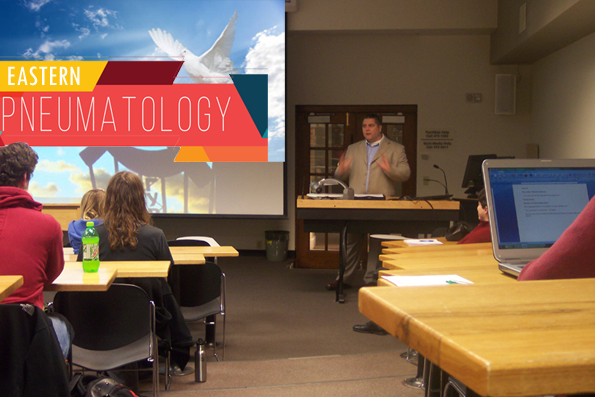The Non-Chalcedonian Eastern Church: West Syrian (Jacobite)

Dony K. Donev, D.Min.: Eastern Pneumotology Lectures
Eastern Orthodoxy can be expressed in one word: theism. The purpose and meaning of life is to become more like God. Deification is pursued by all means of human existence. This quest for divine likeness often includes the typical for the Eastern Church, speculation on the divinity and humanity of Christ, traditions on the doctrine of the Trinity and non-traditional mystical experiences. They appear in the context of both physical and spiritual characteristics in individual and corporate ecclesiastical environment. The role of the Spirit in the process of deification is threefold and involves: creation, re-creation and theism. Eastern Pneumotology follows the graduate process of theism development. The Spirit is involved in the original creation of the world as well as the new-birth experience. His work however, does not end there, but continues throughout the process of personal deification of the believer.
The Non-Chalcedonian Eastern Church: West Syrian (Jacobite)
The Jacobites viewed the presence of the Holy Spirit in three prime settings. Firstly, He is the agent of the original ex-nahilo creation and the spiritual re-creation in the second birth. Secondly, He is present in the baptism and chrismation. Lastly, He is the Transfigurator of the Eucharistic elements representing the body and the blood of Christ.5 [1]
Our prime source of information on the corporate ecclesiastical Coptic tradition is a document entitled The Odes of Solomon. Interesting to notice in this context of this writings is the fact that the Spirit is referred in a feminine gender.[2] However, this conception declined as the devotion to the person of Mary grew.[3]
Such a devotion is extraordinary noticeable in the life and writings of Ephrem the Syrian (ca. 306-373). He further compares the coming of the Holy Spirit upon Mary as the Spirit’s descent over both the water baptism and the elements of the Eucharist.[4] This is why in the Syriac baptismal service; the holy oil is powered onto the water.[5] For the same reason, Ephrem states that the Eucharist means involvement with the hosts of heaven.
Ephrem recognizes Spirit-activity through the entire panorama of salvation. The Spirit is present in the transformation of the fallen human creature into “the pristine of paradisiacal state.”[6] The gift of the Spirit is received in the water baptism where the believer receives a divine armor.[7]
A follower of Ephrem is Philoxenus of Mabbug (ca. 440-523). Among other issues, in his writings, he states that the life in the spirit is nothing else but a process of sanctification. He refers to it also as the spiritualization of the body, which is expressed through the domination of the body by the soul. The above results are possible only after fasting and prayer.[8] A contemporary of Philoxenus by the name of Severus of Antioch (ca. 465-ca. 539) adds to the above process the presence of the gifts of the Holy Spirit in the church as a sign of God’s divine election. In this sense, the Jacobites are carriers of the already-not-yet idea.[9]
[1] J. H. Barnard, The Odes of Solomon, Texts and Studies 8:3 (Cambridge: Cambridge University Press, 1912), 120-21.
[2] Ibid., 67, note on verse 17.
[3] Robert Murray, “Mary, the Second Eve in the Early Syriac Fathers,” Eastern Church Review 3:4 (Autumn 1971): 373.
[4] Ephrem, Nisibene Hymns 37.4 in CSCO 241, Syr. 103:13, and NPF 2nd Series 13:295.
[5] Ephrem, Hymns of Paradise 11, in CSCO 175, Syr. 79:43-46.
[6] Jean Danielou, From Shadows to Reality (Westminster: The Newman Press, 1960), 23-30.
[7] Ephrem, Hymns of the Epiphany 3.1-3, in CSCO 187, Syr. 83:18-19.
[8] E. A. Wallis Budge, The Discourses of Philoxenus, Bishop of Mabbogh, AD 485-519 (London: Asher and Co., 1894), “Eleventh Discourse on Assistance,” Budge 264.
[9] Burgess, 178.







